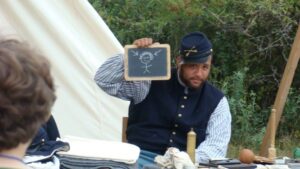BLACK HISTORY MONTH
By Therese Powell
Join the Texas Parks and Wildlife’s Buffalo Soldiers Program this Saturday, Feb. 6, at Cedar Hill State Park as they kick off the first weekend of Black History Month with a program that includes stories, artifacts and soldiers in period 1870s uniforms.
Buffalo Soldiers were African American soldiers who mainly served on the Western frontier following the Civil War. Black slaves and freedmen served during the United States’ early years, but the first all-Black army regiments didn’t happen until 1866 when Congress passed the Army Organization Act and six all-Black cavalry and infantry regiments were formed. In addition to their work on the frontier, these units participated in the Spanish-American War, WWI and WWII. They were disbanded in the 1950s after President Harry Truman issued an executive order eliminating racial segregation in America’s armed forces.

Photo courtesy of Texas Buffalo Soldier Program/Texas Parks & Wildlife
“This is Black history that you’re not typically going to finding in our history books,” said Louis Padilla, program supervisor of the Buffalo Soldiers Program. “It’s another piece of history we should all be proud of — not just African Americans — but everybody, because this is truly a good start to healing and fixing our country.”
Many say the name “buffalo soldiers” was coined by Native Americans who compared the dark hair and skin of the all-Black 9th and 10th Cavalry Regiments to that of bison who roamed the prairie. Another claim suggests that Native Americans revered the soldiers as they did the buffalo because they fought so bravely and fiercely.
The Texas Buffalo Soldiers Program honors those first African American regular army regiments with heritage and outreach events.
“The program connects minority audiences with the Buffalo Soldiers and their outdoor heritage to promote the outdoor recreational opportunities that we have today in our State Park system,” said Padilla. Saturday’s event will share the history of the Buffalo Soldiers and how they lived on the frontier. There will also be special ‘Knowledge Is Power’ sessions throughout the day.
“Private Mack from our group will be delivering a special program on how the Army educated their soldiers and the importance of education to the army, and specifically the Black soldiers,” said Padilla. “This live talk is in conjunction with a larger virtual program on Black history that we’re running on our website throughout the entire month of February.”
Padilla says the group usually presents its content outdoors in the Texas State Parks, but COVID has restricted their time at community events and at the parks.
The virtual program, called Buffalo Soldier University, helps supplement lost in-person time and also celebrates Black History Month with 15 different virtual programs themed at the African American achievements in the outdoors. Online users can learn about the first Black Seminole Scouts, the first Black graduates of West Point to lead Buffalo soldier units and Bessie Coleman, the first female African American pilot, and much more throughout the month of February.
Padilla adds that people should come to the in-person event on Saturday because the living history component coupled with the outdoor experience at Cedar Hill State Park makes for a very rich experience.
“I strongly believe it’s a lifelong memory that you’ll make in one of our Texas State parks — being Cedar Hill or any of the other ones you visit. And then when you add the Buffalo Soldier experience on top of that — hearing their dynamic story, seeing the artifacts they have and really getting a feel of what life was like 150 plus years ago — it’s not something that you’ll get on an everyday basis.”
If you’d like to volunteer with the Texas Buffalo Soldier Program, contact Luis Padillo at [email protected] or leave a message on the group’s Facebook page.
